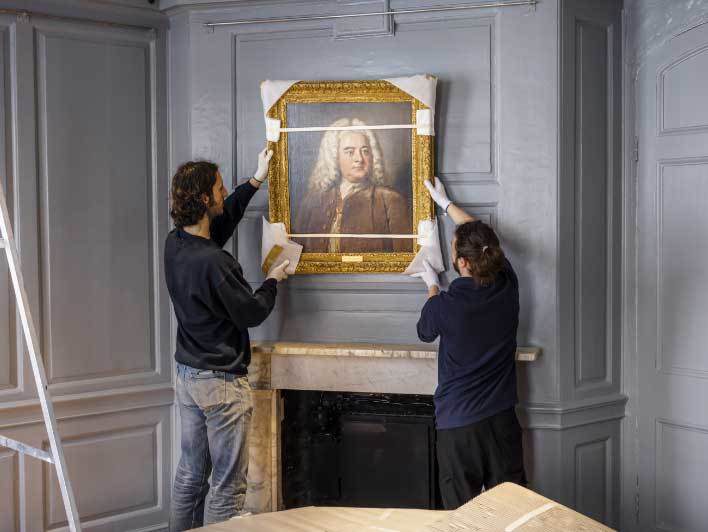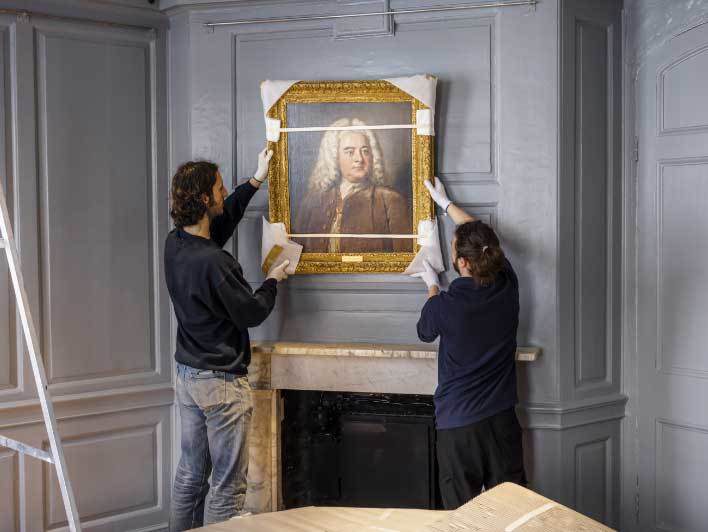ADMETO, RE DI TESSAGLIA (HWV 22)
Libretto: Nicola Francesco Haym or Paolo Antonio Rolli, after Aurelio Aureli
First performance: 31st January 1727, King's Theatre, London
Cast
- Francesco Bernardi, called "Senesino" (Alto-castrato)
- Faustina Bordoni (Soprano)
- Francesca Cuzzoni (Soprano)
- Giuseppe Maria Boschi (Bass)
- Anna Dotti (Contralto)
- Antonio Baldi (Alto-castrato)
- Giovanni Battista Palmerini (Bass)

Synopsis
Act I
Admeto, King of Thessaly, lies mortally ill in his palace, haunted by terryfing dreams. Orindo, a courtier, tells him his brother Trasimede is equally distraught, raving over a woman’s portrait. Ercole (Hercules), on a visit to his friend Admeto, claims that his mighty deeds are motivated solely by a search for glory. Alceste, Admeto’s Queen, prays to Apollo to relieve their agony; the god’s statue replies that only the death of a close relative can save Admeto’s life. As he sleeps she resolves to die for him.
In a neighbouring wood the Trojan princess Antigona and her tutor Meraspe, refugees from Troy (sacked by Ercole), are living disguised as shepherds. Antigona, who was betrothed to Admeto before his marriage to Alceste, blames his illness on the gods’ anger for his broken vow. She sends Meraspe, posing as her father, to the palace.
The palace garden. Alceste, holding a dagger, tells her weeping handmaidens not to bewail her voluntary sacrifice. (The backflats then conceal them). Admeto enters with Ercole, rejoicing in his recovered health. Cries of woe are heard within; the backflats open to reveal Alceste dead. Admeto begs Ercole, who once rescued Theseus from hell, to perform the like service for Alceste. Ercole agrees, leaving Admeto to ponder the delusions fostered by hope.
In the wood Meraspe informs Antigona of Admeto’s recovery and Alceste’s death. They rejoice that Antigona can now marry Admeto, but retire when a hunting party approaches, led by Trasimede, who carries a portrait (of Antigona) and dotes on it. She astonishes him by denying her identity; she is Rosilda, and Fidalbo (Meraspe) is her father. Trasimede invites her to the palace, offering her a job as a gardener. Antigona looks forward to showing Admeto the error of his ways.

Act II
Alceste is in Hades, chained to a rock and tormented by Furies. Ercole throws Cerberus into an abyss, beats and drives out the Furies, and releases Alceste. She looks forward eagerly to Admeto’s welcome.
The palace garden. Antigona rejects an amourous advance from Orindo. Trasimede enters and, preferring the substance to the shadow, throws down her portrait; Orindo picks it up. Antigona, resolved to have Admeto or nobody, rejects Trasimede too.
Orindo gives Admeto Antigona’s portrait; he says it cannot represent her, since Trasimede, when sent to Troy to negotiate the marriage, brought back a different portrait. When ‘Rosilda’ enters, he is astonished by the resemblance between the portrait and his new gardener. She says she saw Trasimede doting on the portrait and lamenting Antigona’s death. He realises that Trasimede must have fobbed him off with a portrait of someone else. Trasimede overhears this and reolves to have the portrait stolen. When ‘Rosilda’ asks Admeto whether he would marry Antigona if she were still alive he says he does not know and departs abruptly, leaving her a prey to fears.
A wood. Alceste, in male disguise as a soldier, and anxious to know whether Admeto has taken another love in her absence, sends Ercole ahead to say that he could not find her in Hades. She is consumed by jealousy. Admeto, depressed by the thought of loving two women, both of them dead, resolves to die himself. Trasimede, who has abducted ‘Rosilda’ because of her resemblance to Antigona, is persuaded to release her. A page brings him a portrait, which he recognises as one of Admeto and orders it to be returned to the palace. The page drops it by mistake, and Antigona is delighted to pick it up. The disguised Alceste sees her kissing it and assumes the worst. She asks Antigona, who admits to loving Admeto, whether she has any hope of her love being returned. Antigona cannot answer. Alceste begins cursing Admeto, but checks herself; until she learns the truth she will be true to her duty.

Act III
A courtyard. Meraspe informs Admeto os ‘Rosilda’s’ arrest, revealing her true identity and her hopes of marrying the widowed king (he does not know that Trasimede has since released her). Orindo reports that Ercole has returned from Hades alone, and is sent to find Antigona and her abductors. Meraspe assures Admeto of Antigona’s love and fidelity. Admeto is torn between longing for the dead Alceste and sympathy for the kidnapped Antigona. When Ercole tells him that Alceste must be in Elysium since he could not find her in Hades, he concludes that everything conspires to throw him into Antigona’s arms. Ercole, surprised that his false news evoked no expression of regret, concludes that Alceste has reasons for jealousy.
Antigona, again kissing Admeto’s portrait, has barely begun an aria when Alceste (still disguised as a soldier) snatches the portrait. Orindo, entering with a troop of soldiers, takes Alceste for the abductor of Antigona and puts her under arrest. Antigona angrily snatches back the portrait and continues her aria. Ercole, astonished to find Alceste in chains, forces the soldiers to release her. He tells Alceste bluntly that the king loves another woman. Striving to conquer her jealousy, she imagines flowers, breezes and birds gracing Admeto’s path.
The palace. Trasimede hears from Meraspe that Antigona is to marry Admeto and for the first time learns the identity of ‘Rosilda’. He vows to kill his brother. Admeto and Antigona sing a love duet, overheard by Alceste and Trasimede. The latter is about to strike Admeto when Alceste snatches the sword from his hand. Trasimede slips away; Admeto, taking Alceste to be his assailant, orders her arrest. Only then does he recognise her. Trasimede returns and is forgiven. When Admeto hesitates between the two women, Antigona takes Alceste by the hand and presents her to Admeto as having twice saved his life. Trasimede goes unrewarded. Alceste sings a love song to her husband, who acknowledges his debt to both ladies: ho owes his life to one, to the other his honour.
Context
Admeto was the second of Handel’s operas for the ‘Rival Queens’ Faustina Bordoni and Francesca Cuzzoni. Handel’s neighbour Mary Pendarves attended the first rehearsal on 25th January 1727 with a friend who, she told her sister in a letter, was driven ‘out of her senses’ by the performances of Senesino, Cuzzoni and Faustina. Charles Burney, the music historian, was ‘told by persons who heard this opera performed when it first came out, that Senesino never sung or acted better, or more to the satisfaction of the public, than in the opening scene’. The opera ran for 19 performances, with a few cancellations due to the indisposition first of Faustina and then Cuzzoni.
It was during a performance of this opera that, according to Burney, a man in the gallery hailed Cuzzoni at the end of one aria with the immortal words, ‘Damn her: she has got a nest of nightingales in her belly’. Lady Cowper made a note in her copy of the word book against Faustina’s name: ‘She is the devil of a singer’.
Clearly, each of these great divas was attracting a loyal following. Indeed this loyalty was gradually turning into a bitter rivalry, not between the singers themselves but rather between their followers. Things came to a head during the performance of Admeto on Tuesday 4th April when both singers were hissed and booed in turn by audience factions supporting the other singer. Princess Amelia, the granddaughter of King George I, was present at the performance and the unruly behaviour of the audience caused a public scandal. The Countess of Pembroke, one of Cuzzoni’s supporters, wrote an apologetic letter to the royal family on Cuzzoni’s behalf, attempting to explain the root of the discord:
…Cuzzoni had been publicly told…she was to be hissed off the stage on Tuesday; she was in such concern at this, that she had a great mind not to sing, but I…positively ordered her not to quit the stage, but let them do what they would…and she owns now that if she had not had that order she would have quitted the stage when they cat-called her to such a degree in one song, that she was not heard one note, which provoked the people that liked her so much, that they were not able to get the better of their resentment, but would not suffer the Faustina to speak afterwards.Countess Pembroke concludes by hoping that the unacceptable behaviour of Cuzzoni’s supporters, provoked as they were by Faustina’s, would not reflect badly on her favourite’s future appearances.
On 13th February 1727 Handel applied to parliament for naturalisation. His petition was added as an ammendment to the Act for Naturalisation of Louis Sechehaye which had already had one reading in the House. Such petitions were not often heard, and it was not unusual for applicants to add their name to an existing Act that was already under consideration.
The Act was agreed by King George I and passed into law on 20th February 1727, and George Frideric Handel became a British citizen.


